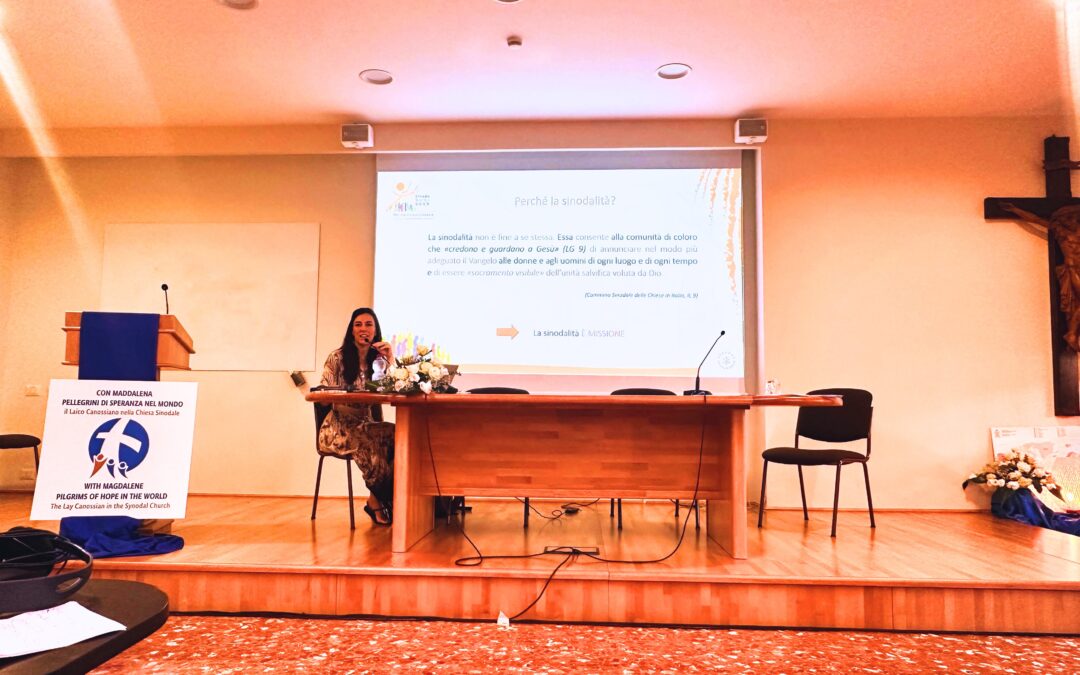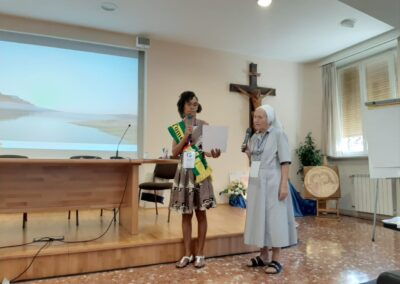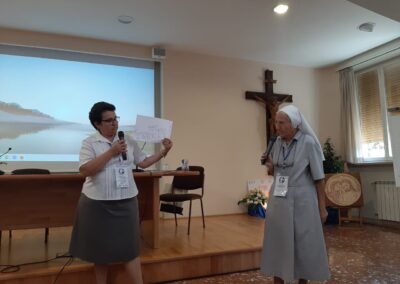“The path of synodality is the path that God expects of the Church of the third millennium. (Pope Francis)
With these words of Pope Francis, the 7th International Congress of the Canossian Lay Association opened with a reflection on synodality, led by Dr. Erica Tossani, Director of Caritas and facilitator at the Synod of Bishops in 2023 and 2024.
In her keynote address, Dr. Tossani offered the participants a profound immersion into the spirit and essence of synodality, drawing from her personal experience and insight gained through her involvement in the synodal process. She began by presenting a video from the 2024 Synod of Bishops, enriched by the moving words of Pope Francis, emphasizing that the synodal journey is not merely an ecclesial update, but a true change of posture—a transformation in how the Church lives and relates.
One of the central themes she highlighted was the importance of listening. Dr. Tossani recalled how Pope Francis deliberately chose silence during the Synod Assembly—a powerful and intentional silence, signifying a Church that does not speak first, but first listens. Authentic listening, she explained, means opening oneself to the other, even when their words are challenging, uncomfortable, or provoke inner conflict. It calls for making space for diverse voices, including those that may feel dissonant or unsettling.
She went on to say that listening alone is not enough—the other must be recognized. At the heart of synodality lies a fundamental intuition: the other is not a problem to be solved, but a face to be recognized in their full dignity and uniqueness. It is not about welcoming others in order to “fix” them, but about recognizing their presence as a gift. She pointed to several powerful signs from the Synod, such as the opening ecumenical vigil, the presence of fraternal delegates, and the participation of LGBTQ community members—not as symbolic gestures, but as concrete acts of recognition and shared responsibility.
Dr. Tossani strongly emphasized the need to broaden participation. Echoing Pope Francis’s insistent call for “todos, todos, todos” (“everyone, everyone, everyone”), she stressed that synodality is not a source of confusion but a path to communal discernment, where each person—with their own gifts, experiences, and limitations—has a role in building up the Church. This requires moving beyond paternalistic models and creating real spaces of engagement—not simply filling roles, but forming spaces where people can genuinely contribute. Participation, she noted, also means taking responsibility, caring for the common good, building networks, speaking out against injustice, and proposing concrete alternatives—both within the Church and in society.
True participation, she added, is built on trust, and trust is born of transparency and accountability. In this light, she addressed the painful issue of abuse within the Church—not only physical, but also abuses of power—affirming that transparency is the first step toward healing. She recalled the penitential vigil that opened the second session of the Synod, during which seven cardinals publicly asked for forgiveness: a prophetic gesture, met with both criticism and gratitude, but vital for rebuilding credibility and restoring bonds of trust.
Another key point in her address was the role of authority within a synodal Church. Dr. Tossani affirmed that synodality does not reject authority—it reimagines it in the light of the Gospel. Authority is not power exercised “from above”, but service lived “in the midst” of the people, safeguarding unity and fostering harmony amid diversity. The synodal leader is one who initiates processes, encourages the transition from “I” to “we”, sustains a shared vision, and accompanies the collective journey. In an era dominated by authoritarian leadership models, the Church offers a different paradigm: a form of authority rooted in credibility, not control.
Finally, Dr. Tossani identified “unity in diversity” as the true prophetic message of synodality for our times. Synodality is not just an internal reform of the Church, but a living testimony to the world. In a society marked by polarization, individualism, and violence, the synodal Church proposes another way of being: not uniformity, but communion through difference. It is not about finding a universal formula that fits all, but about discerning together—over time—how to walk forward in diversity, safeguarding what is essential and letting go of what divides.
A reference was also made to the inaugural address of Pope Leo, who, in his first Urbi et Orbi blessing, pronounced the following words:
“To all of you, brothers and sisters of Rome, of Italy, and of the whole world: we want to be a synodal Church, a Church that walks…”
To conclude her talk, Dr. Tossani introduced the method of “Conversation in the Spirit”, which participants then practiced in their language-based working groups. The outcomes of these group discussions were later shared in plenary, initiating a communal process of reflection and dialogue fully aligned with the synodal spirit.















